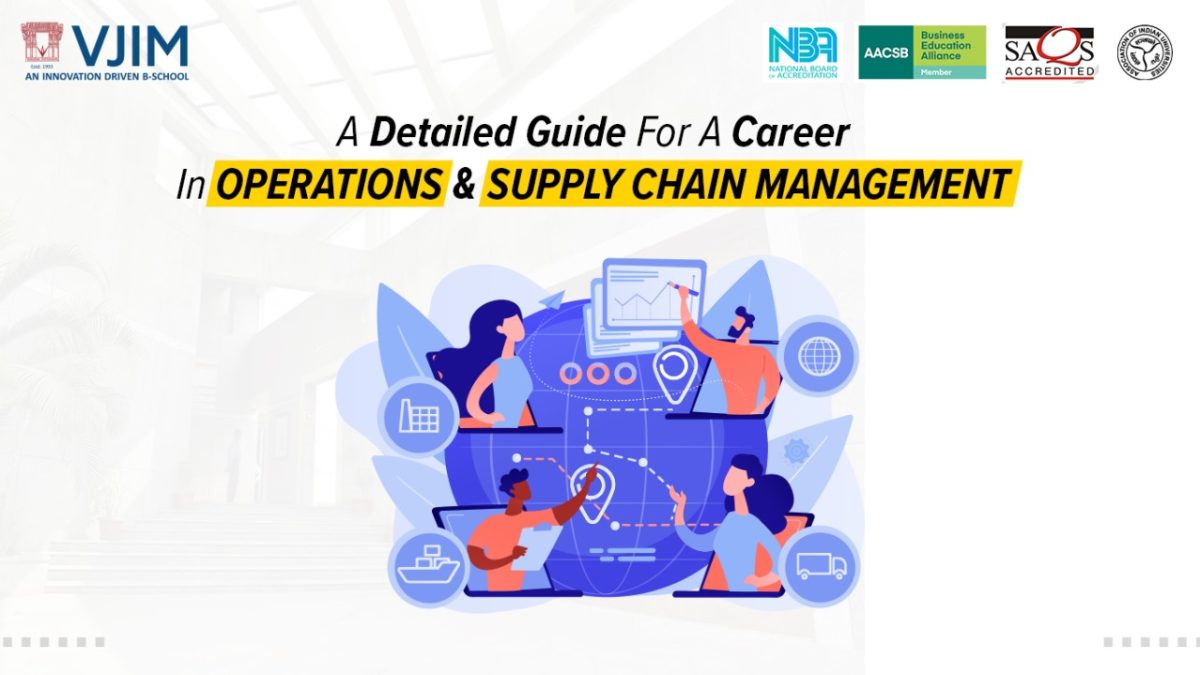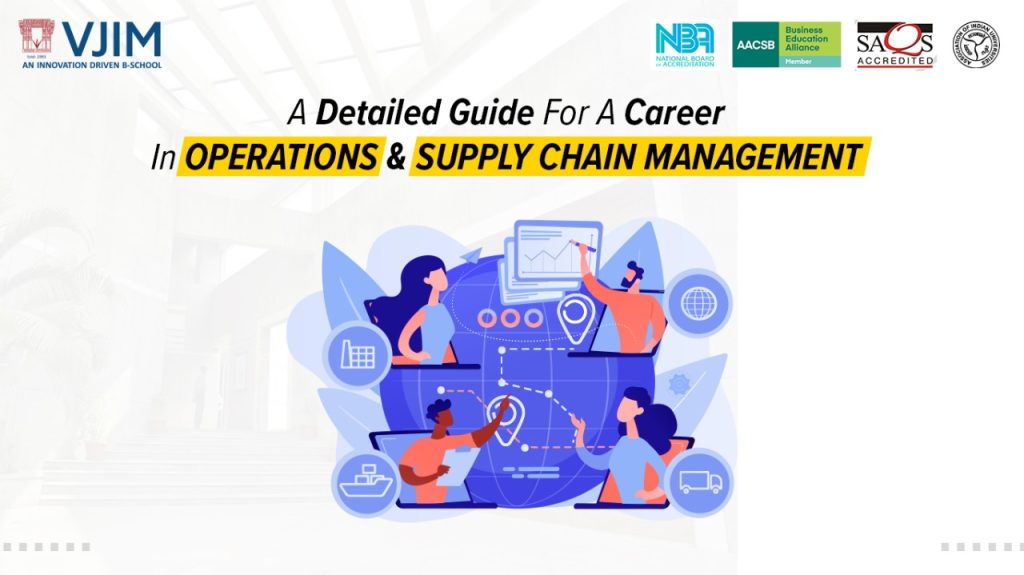Operations and Supply Chain Management (SCM) is a fundamental business function responsible for planning, coordinating, and controlling the flow of goods and services from suppliers to customers. A career in operations and SCM is both challenging and rewarding.
Effective management of operations and supply chains demands specialized knowledge, skills, and expertise, including procurement, logistics, inventory management, and quality control. Professionals in this field are tasked with developing and implementing strategies that optimize processes, minimize waste, and reduce costs while maintaining high product quality and customer satisfaction.
A career in operations and SCM presents numerous opportunities for personal and professional growth.
In this article, we explore the promising career path in Operations and Supply Chain Management (OSCM) and explain how professionals in this field contribute to the efficiency and growth of businesses.
What is Operations and Supply Chain Management?
Operations and Supply Chain Management optimizes business processes, reduces costs, and ensures customer satisfaction. It includes procurement, production, distribution, inventory management, supply chain coordination, quality control, technology integration, sustainability practices, risk management, and continuous improvement.
- Procurement involves acquiring raw materials, components, and services needed for production.
- Production consists of transforming raw materials into finished goods while minimizing costs.
- Distribution and Logistics move goods efficiently. Inventory management balances supply and demand.
- Supply Chain Coordination aligns processes and goals.
- Quality Control ensures products meet customer expectations. Technology Integration enhances efficiency and decision-making.
- Sustainability Practices minimize environmental impact.
- Risk Management mitigates potential disruptions. Continuous improvement enhances performance.
Key Roles And Responsibilities In Operations and Supply Chain Management
Operations and Supply Chain Management (OSCM) involves various roles and responsibilities to ensure the seamless flow of goods and services from the source to the end consumer. You would be responsible for ensuring efficiency, cost-effectiveness and customer satisfaction throughout the entire supply chain. Below are the key roles and their associated responsibilities in OSCM.
– Supply Chain Analyst: Analyzing data and collaborating to optimize processes.
– Operations Manager: Oversees day-to-day operations and implements strategies.
– Logistics Coordinator: Manages movement of goods and optimizes distribution.
– Procurement Manager: Identifying suppliers and ensuring reliable and cost-effective materials supply.
– Inventory Manager: Monitor and manage inventory levels to optimize working capital and ensure availability.
– Demand Planner: Forecasting future demand and aligning production with anticipated demand.
– Quality Control Manager: Establishing quality control processes and improving quality management systems.
– Distribution Manager: Overseeing efficient distribution of products to retailers or end consumers.
– Strategic Sourcing Manager: Developing strategies for sourcing goods and services.
– Continuous Improvement Specialist: Identifying and eliminating inefficiencies to reduce waste.
– Technology Integration Specialist: Managing technologies to optimize supply chain processes.
– Sustainability Manager: Developing sustainable practices and improving environmental and ethical aspects of operations.
– Risk Management Specialist: Identifying and assessing potential risks and developing mitigation strategies.
Skill Required For A Career In Operations and Supply Chain Management
Professionals in Operations and Supply Chain Management (OSCM) must have technical expertise, interpersonal skills, and strategic thinking abilities for a successful career. The following are some of the critical skills required to thrive in this industry
- Analytical Skills: Analyzing data, identifying patterns, and interpreting trends are essential for making informed decisions in demand forecasting, inventory management, and process optimization.
- Problem-Solving Skills: The ability to identify issues, develop practical solutions, and implement corrective actions is vital in addressing challenges that may arise in the supply chain and operations processes.
- Communication Skills: These are important for collaborating with cross-functional teams, negotiating with suppliers, and conveying complex information to various stakeholders within and outside the organization.
- Project Management: Coordinating multiple tasks, managing timelines, and completing projects on time are critical skills for overseeing complex supply chain and operations projects.
- Attention to Detail: Precision in monitoring inventory levels, quality control, and other operational processes is crucial to prevent errors and ensure the accuracy of information throughout the supply chain.
- Decision-Making Skills: Making well-informed decisions under pressure is essential for maintaining efficient operations.
- Negotiation Skills: Strong negotiation skills can contribute to cost savings and favourable terms when negotiating with suppliers, service providers, and internal stakeholders.
- Cross-Functional Collaboration: Collaboration skills are crucial for fostering positive relationships and aligning goals to achieve organizational success.
- Leadership Skills: Leadership qualities are essential for operations managers and team leaders. These skills involve inspiring and guiding teams toward common objectives and promoting a positive working environment.
- Adaptability and Flexibility: Adaptable to changes in market conditions, technological advancements may impact operations.
- Technical Proficiency: Depending on the role, proficiency in relevant technologies, such as Enterprise Resource Planning (ERP) systems, data analytics tools, and supply chain management software, is essential for effective operations.
- Global Perspective: Understanding international trade regulations, cultural differences, and global supply chain dynamics is essential for managing operations worldwide.
- Strategic Thinking: Developing and implementing long-term strategies to optimize the supply chain, reduce costs, and improve overall efficiency requires a strategic mindset.
- Time Management: Efficient time management is crucial for meeting deadlines, ensuring timely deliveries, and optimizing production schedules.
- Customer Focus: Keeping the customer in mind throughout the supply chain process ensures customer satisfaction and loyalty. This involves understanding and meeting customer expectations.
Operations and Supply Chain Management At VJIM
Operations specialization in VJIM focuses on providing exposure to tools and techniques to solve problems related to operations and allied issues. The operations specialization concentrates on the qualitative and quantitative approaches to solve any operational problem in all business functions. Different pedagogy methods like case studies, simulations, and field visits are used to disseminate knowledge in operations management.
Quality Management System is an added advantage for continual development in the learning process. The diverse and rich expertise in operations concepts and technical skill sets would help solve issues in manufacturing and service-based industries.
Operations specialization subjects:
Core
Operations Management
Project Management
Elective
Logistics & Supply Chain Management
Supply Chain Analytics
Service Operations Management
Purchase & Negotiations Management
Total Quality Management
Six Sigma
Lean Management
Operations Research
Conclusion
Developing a combination of skills can significantly enhance effectiveness in the challenging and dynamic Operations and Supply Chain Management field. Continuous learning and staying up-to-date with industry trends and technologies are crucial to success in this rapidly evolving field.
Professionals in Operations and Supply Chain Management require technical expertise, analytical skills, communication abilities, and the capacity to collaborate across different functions. They play a vital role in the overall success of an organization by ensuring efficiency, cost-effectiveness, and customer satisfaction throughout the supply chain.
Effective Operations and Supply Chain Management can contribute to organizational success by ensuring efficient processes, cost savings, customer satisfaction, and adaptability to changing market conditions. Professionals in this field optimize operations to meet business goals and deliver customer value.










